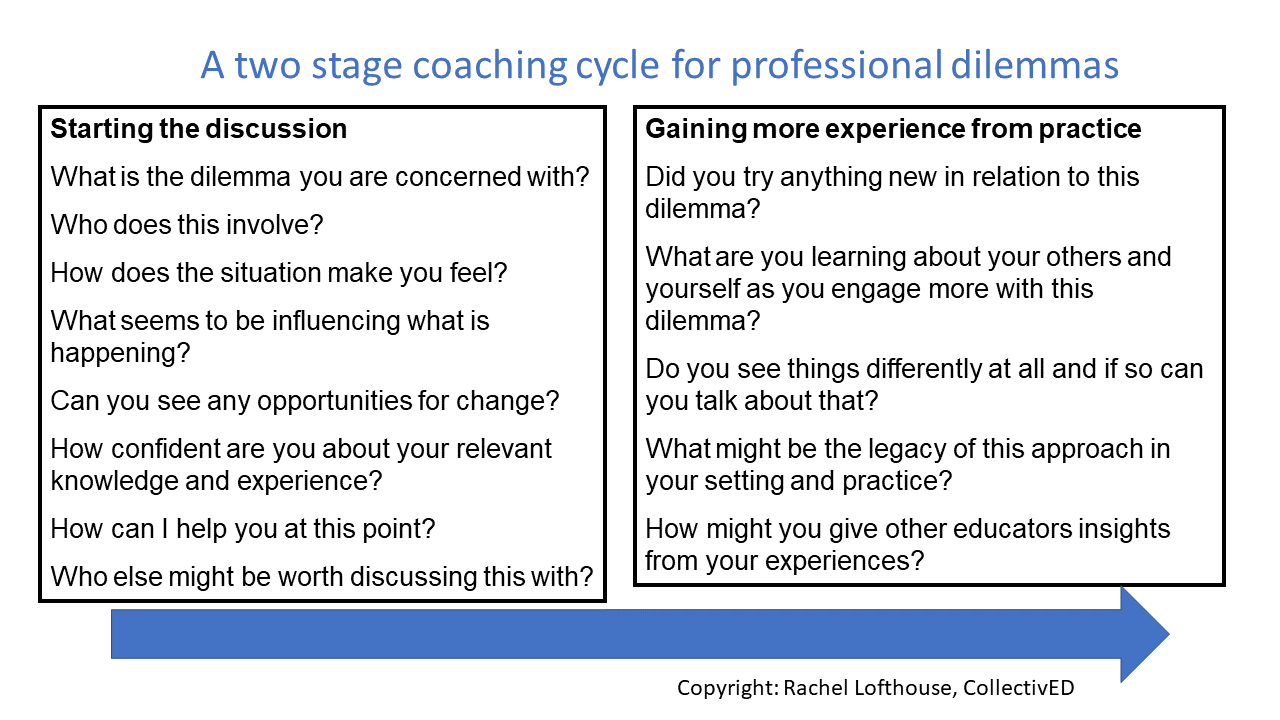April 30th 2021
As an academic I am committed to sharing ideas with others who might find them useful in practice, and as director of CollectivED I take a stance to be as collaborative in knowledge-building as possible. This week has given me a chance to begin a new project with these values at their heart.
So, first let me join dots in the proposition and sharing of a new idea. One of the Erasmsus+ projects that I currently engaged in is the PROMISE project ‘Promoting Inclusion in Society through Education: Professional Dilemmas in Practice’. The focus of PROMISE is the professional development of educators and the promotion of high-quality and innovative teaching in a range of educational sectors, with a recognition that many of the challenges or professional dilemmas facing educators are embedded in issues related to inclusion. At a recent European learning event we introduced a model of ‘dilemma-based coaching’, giving participants (educators from across phases and roles) an opportunity to engage in coaching-type conversations which were stimulated by sharing a specific dilemma they were experiencing. We framed this with my current definition of coaching, although acknowledged that the learning event created an episode rather than a sustained opportunity.
‘Coaching in education is an inter-personal and sustained dialogue-based practice. The coach works with a coachee to facilitate self-reflection, decision making and action in the context of their own personal and professional challenges.’

Following this first experience of using the dilemma-based coaching approach I was able to offer it to our current students on the PGCert in Coaching and Mentoring for Education Practitioners as a workshop activity in which two participants held a conversation using the given structure. Both they and their fellow students (who observed the conversation) gave positive feedback about the nature of the dialogue and its potential applicability in their contexts, which span primary to higher education settings and include special education and international schools.
These two events offered me pause for thought. They indicated that the dilemma-based coaching approach had legs. They also demonstrated an interest from educators in a range of settings to talk about how and why it might be of value. And so, a new collaborative research project with CollectivED Fellows has been triggered with a focus on exploring and learning from educational complexity through dilemma-based coaching. As the research project unfolds it will be collaborative in nature and draw on the task and team support enabled through the fellowship network. Bevins and Price, (2014) describe task support as time to engage and collaborate and shared workload across multiple activities and note that team support is created by a group dynamic and their complementary skill set, mutuality and cohesion. It is also anticipated that the project will take the form of collaborative action research with the multiple partners engaging in proximal, contributory and collaborative activities over time (Lofthouse et al. (2016). Research ideas have already been shared, potential uses of the approach have been explored and conversations with colleagues and in networks beyond CollectivED are underway. The journey has begun….
Bevins, S. C., and G. Price. 2014. Collaboration between academics and Teachers: a Complex Relationship. Educational Action Research 22:2, 270–284.
Lofthouse, R., Flanagan, J. and Wigley, B. (2016) A new model of collaborative action research; theorising from inter-professional practice development, Educational Action Research, 24:4, 519-534
See original blog post at: